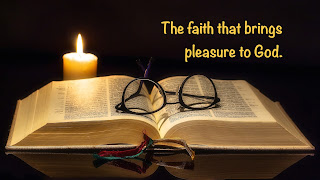An Ode To The Foolishness of Faith
 |
| Pixabay |
This morning I was playing catch-up in my reading (yes, I do sometimes get behind—with or without a valid excuse). Sure enough, Abraham is the heart of the passages that I needed to read. He plays a large part in the Hebrews 11 description of people of faith, those who believed where there was no evidence to support the promises made to them.
In Genesis 12, Abram left Haran and completed the journey his father had begun—the journey to Canaan. He would never see the fulfillment of the promises God made to him. When he arrived in Canaan, God confirmed that promise: “Lift up your eyes from where you are and look north and south, east and west. All the land that you see I will give you and your offspring forever. I will make your offspring like the dust of the earth, so that if anyone could count the dust, then your offspring could be counted. Go walk through the length and breadth of the land, for I am giving it to you” (Genesis 13:14-17).
Abraham lived in tents all his life. At the time of receiving this message from God, he had no son, and both he and his wife were well beyond child-bearing years. Abraham didn’t always practice his faith—to believe without evidence to support that belief—as the episode in Genesis 16 tells us in the sad story of Hagar and Ishmael. Like us, he had his moments when human reasoning overshadowed faith. Perhaps it was Abram’s inability to provide evidence of God’s faithfulness to his wife (she still had no kid!) that made him give in to her human desire to “help” God do what He had promised.
In Genesis 15, before the fatal act of trying to “help” God, Abraham met again with God. The Almighty confirmed again what He had promised earlier: “‘Look at the heavens and count the stars—if indeed you can count them.’ Then he said to him, ‘So shall your offspring be.’ Abram believed God. and he credited it to him as righteousness” (Genesis 15:5, 6).
It’s hard to practice faith without something tangible, something provable to hang onto. Abraham was no different than we are. When God promised him (again) the land of Canaan, Abram, as he was named then, asked, “…How can I know…” (15:8) and the Lord was gracious enough to grant him a sign (15:9-19).
At the end of Luke, we are told about one occasion when Jesus appeared to His disciples after the resurrection. Thomas had not been present at an earlier appearance and doubted the stories of his compatriots about having had an encounter with the Lord. This time Jesus came when Thomas was present, offered His hands and His side as evidence of His resurrection. The text doesn’t say if Thomas accepted that invitation, but he quickly confirmed his faith. Jesus’ response is easily applied to so many of the circumstances in our lives where faith must be applied: “Because you have seen me, you have believed; blessed are those who have not seen and yet have believed” (Luke 20:29).
God graciously allows us signs. “The heavens declare the glory of God” as Psalm 19:1 tells us—the signs are all around us. God has revealed Himself through Jesus, as we are told in Hebrews 1:2, "...in these last days he has spoken to us by his son, whom he appointed heir of all things, and through whom he made the universe." But though He moves into our lives to meet our needs time after time, He knows the weakness of our trust in Him. We have “evidence” from our past, but each new need seems to require a new exercise of faith. Will we believe in this situation, under these circumstances, that He will do what He has promised?
Perhaps nowhere is the nature of faith tested more than when we consider our eternal destiny. We have deposited our immortal souls into the hands of One who promised us heaven and eternal life—neither of which we can prove. But, as Paul writes, in this, "We live by faith, not by sight" (2 Corinthians 5:7). We believe though we have not yet seen.
That's faith—foolish or not!



Comments
Post a Comment